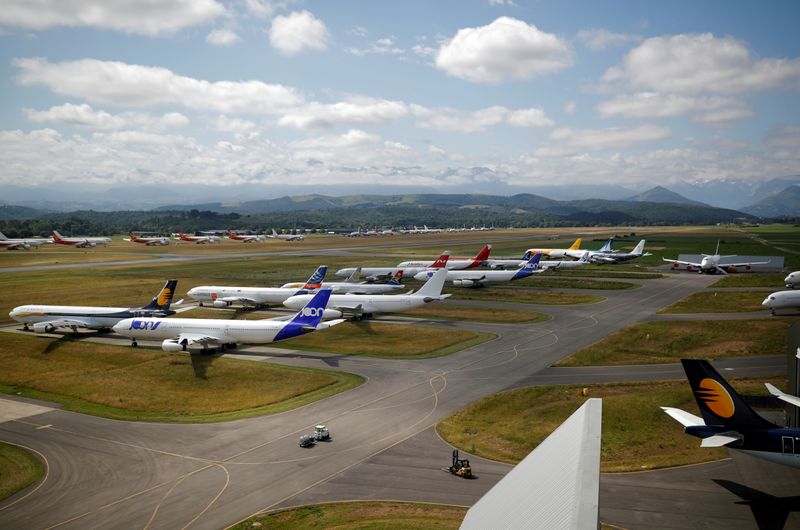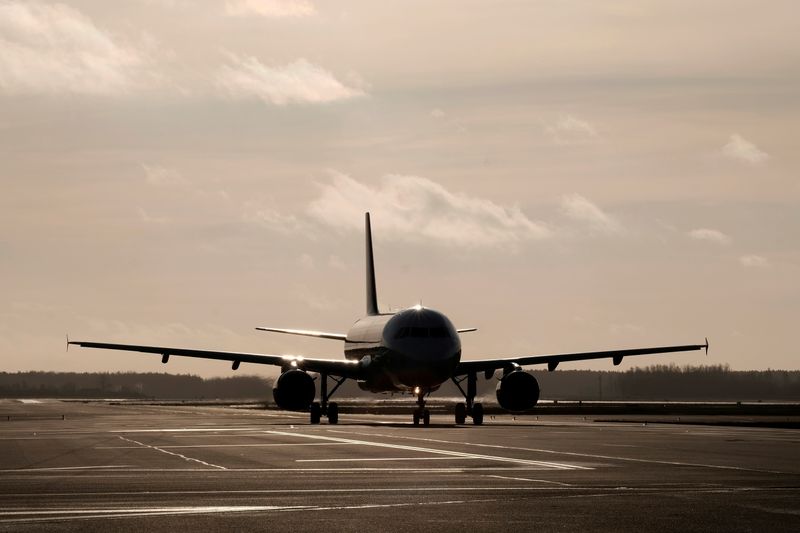By Jamie Freed
SYDNEY (Reuters) - Regulators, insurers and experts are warning airlines to take extra care when reactivating planes left in extended storage during the COVID-19 pandemic, citing potential pilot rustiness, maintenance errors and even insect nests blocking key sensors.
The unprecedented number of aircraft grounded as coronavirus lockdowns blocked air travel - at one point reaching two-thirds of the global fleet - has created a spike in the number of reported problems as airlines return them to service.
The number of "unstabilised" or poorly handled approaches has risen sharply this year, according to the International Air Transport Association (IATA). Such mishaps can result in hard landings, runway overshoots or even crashes.
Worried by IATA's data, insurers are questioning airlines about whether they are doing extra pilot training to focus on landings, said Gary Moran, head of Asia aviation at insurance broker Aon (NYSE:AON) PLC.
"They want to know about the circumstances of the training," he said.
Approaches and landings place significant demands on crew for which training and regular experience are seen as vital.
According to aircraft maker Airbus SE (OTC:EADSY), the largest category of fatal accidents can be traced back to the approach to an airport, while the largest number of non-fatal accidents happen during landing.
In May, a Pakistan International Airlines jet crashed after an unstabilised approach, killing 97 people, while 18 died in an Air India Express crash on landing in August, also after an unstabilised approach.
INSECTS IN TUBES
Training is not the only concern.
The European Union Aviation Safety Agency (EASA) has reported an "alarming trend" in the number of reports of unreliable airspeed and altitude readings during the first flight after a plane leaves storage.
In some cases, take-offs had to be abandoned or the aircraft had to return to base.
In most cases, the problem was traced back to undetected insect nests inside the aircraft's pitot tubes, pressure-sensitive sensors that feed key data to an avionics computer.
In June, a Wizz Air Holdings PLC jet halted take-off after the captain found the airspeed was reading zero.
Examination of the plane found insect larvae in one of the pitot tubes, with the aircraft having been parked for 12 weeks before the flight, the U.K. Air Accidents Investigation Branch said last month. No passengers were on board.
Insects blocking a pitot tube contributed to the 1996 crash of a chartered Birgenair plane in the Dominican Republic that killed all 189 people on board.
Kate Seaton, a Singapore-based aerospace partner at law firm HFW, said flight crews need to be aware of potential defects that might not have been identified properly as planes return to service after an unprecedented grounding.
"We are in new territory - the industry must take steps to mitigate the risks but need to be prepared for the unexpected," she said.
HONEST ASSESSMENT
EASA said last month that issues found after prolonged parking included an engine shutdown in flight after technical problems, fuel system contamination, reduced parking brake pressure and emergency batteries losing their charge.
"We've got people returning to work who are quite rusty, which is a big issue," insurer Aon's Moran said.
Airlines have developed training programmes for pilots re-entering service ranging from theory refreshers to multiple simulator sessions and supervised in-flight checks, depending on the length of absence.
Australia's aviation regulator said on Nov. 30 its inspectors would beef up surveillance on COVID-19 related risks involving the re-entry into service, pilot training and safety risk management for the remainder of the year through to June 30, 2021.
Pilots also need to make an honest assessment of their skills and confidence upon returning to work, International Federation of Air Line Pilots' Associations representative Peter Meiresonne said at an industry webinar in October. They may need to turn down offers like shorter landing approaches from air traffic control if they do not feel ready, he said.

"Maybe now is a good time to say, 'We are not able today' or 'Give us a six- or 10-mile lineup rather than a four-mile lineup', which you might accept when you are more proficient and (flight experience is) more recent," he said.
